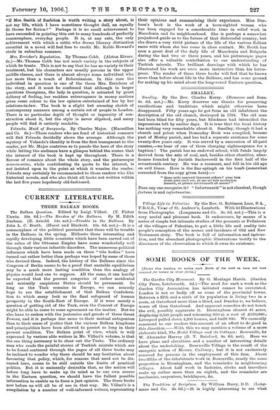The Tradition of Scripture. By William Barry, D.D. (Long- mans
and Co. 3s. 6d.)—It is highly interesting to see what position a Roman Catholic divine to whom the function of teach- ing the teachers of the future has been committed takes up in regard to criticism and modern thought. We do not care to deal with this volume in a controversial spirit. We may leave Dr. Barry and his friends to settle accounts with the Tridentine and Vatican decrees. What are his views on the great critical problems of Biblical study ? We may take as an example the question of the composition of the Pentateuch. Dr. Barry practically accepts the theory of the documents out of which the five, or, rather, as Joshua is included, the six, books aro made. "The clue," he writes, "was thrown out by Astra°, a Catholic physician, who in 1750 published his epoch-making discovery of two documents (A and B) in the Pentateuch, each having its own name for the Deity These positions of Astruc, modified in part by more recent criticism, are substantially admitted to-day on all hands." [We wonder how far this is true of the great body of the clergy in the Anglican, Presbyterian, and Free Churches,—not to mention the ordinary priests, monks, and nuns of the Roman Church.] Dr. Barry does not accept the reasoning which the late Bishop Ellicott drew out in" Christus Cornprobator." He affirms that such words as "the Law was given through Moses ; grace and truth came through Jesus Christ," postulate the fact of a law given by the great Lawgiver. He insists that this does not bar a "literary analysis of the record. No investigations bearing on the latter point were undertaken by the Apostles ; and we could scarcely imagine their Divine Master turning aside from the Sermon on the Mount to argue such things with Scribes and Pharisees Our special questions, being foreign to the Apostles, remain exactly where they would be if the New Testa- ment, when it speaks of writings by Moses, used the current language, but passed no judgment upon it." That is exactly what the critics contend. Their adversaries maintain that every reference made by Christ to Moses or Daniel, or any Old Testa- ment person or utterance, finally settles every question, historical or literary, with which it is concerned. A second example may be taken in the Book of Daniel. Dr. Barry writes : " It has been felt that for a prophet of 580-540 to give his message a Macca- baean horizon' horizon' clear in minute detail up to a certain point, while unconnected with any circumstances of his own time, is not according to the analogy of Scripture." And he quotes the general decision of " Catholic writers" against the view which St. Augus- tine favoured, that the Psalms of exile were prophetic utterances of David. That there was an historical Daniel one need have no difficulty in believing ; but that the whole story of Daniel as we have it in detail is exact seems impossible. Dr. Barry expresses himself in a guarded manner. Perhaps we might say that he states, without explicitly adopting, these and other hypotheses. But he certainly does not condemn them. The future belongs to a reasonably free criticism, which is not inconsistent with belief ; the obstinate obscurantism of certain Anglican authorities must, if persisted in, end in disaster.











































 Previous page
Previous page